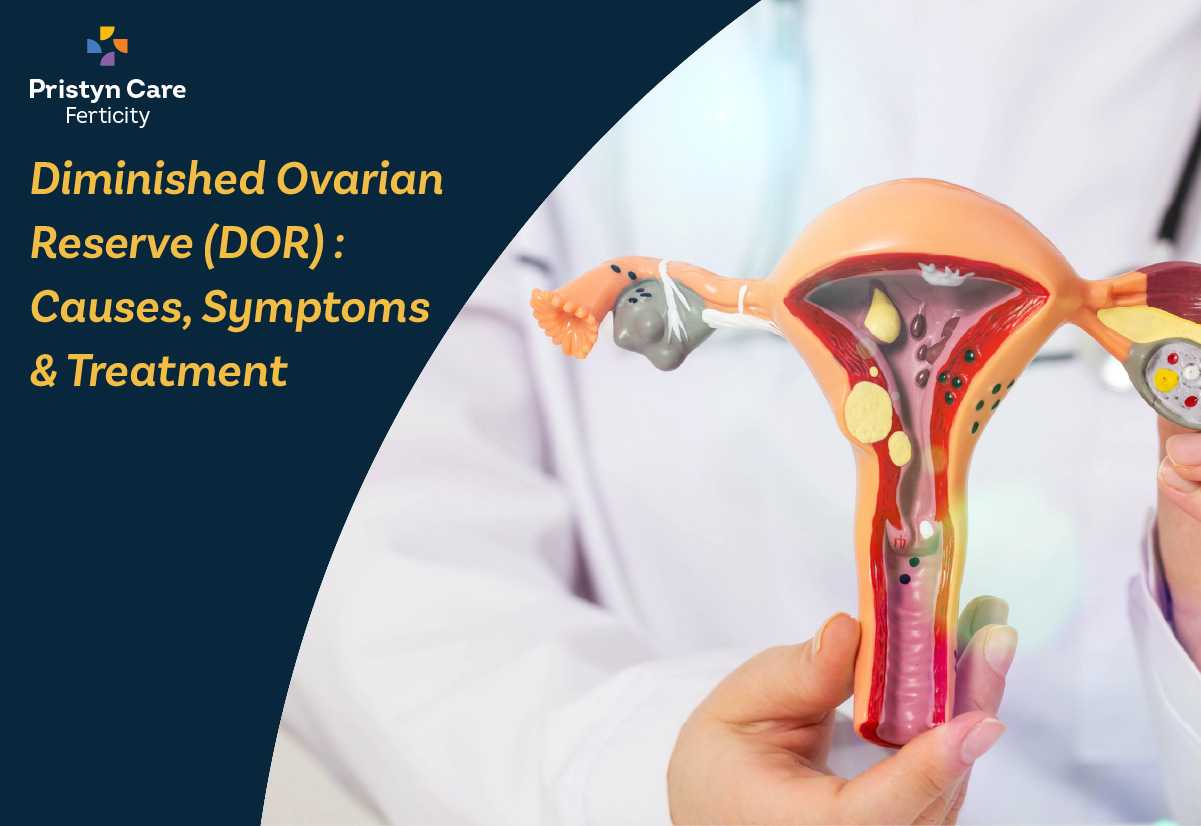When your egg count is lower than what is expected for your age, such a condition is called diminished ovarian reserve (DOR). Having fewer makes it harder to get pregnant. Though it is common for egg count to drop with progressing age, in some women, it takes place much earlier than expected. There are some specific tests through which gynecologists diagnose poor ovarian reserve (POR).
However, having fewer eggs doesn’t imply no chances of pregnancy. It only makes it more difficult to conceive and may need fertility treatments. Many women with low ovarian reserve still have successful pregnancies. You just have to know your options and act at the earliest!
Females are born with all the eggs they’ll require for life, but they don’t last forever. Age has the most crucial part to play, and post 35 years, the decline in egg number speeds up. On average, a baby girl starts with 1 to 2 million eggs, when she reaches puberty stage, only about 300,000 to 400,000 remain. By 40, the egg reserve drops to around 25,000, and by menopause, even less than 1,000 remain. This is a natural phenomenon and if you want to know about your egg count, only a specialist can help you check it through ovarian reserve testing. While this is a natural process, if you’re curious about your egg count, a doctor can check it through ovarian reserve testing.
Recognize these symptoms of diminished ovarian reserve (DOR) to manage it properly:
Low ovarian reserve may not exhibit obvious signs initially, but you might notice changes that shouldn’t be ignored. Since these symptoms imitate other hormonal issues, it’s best to check with a gynecologist or fertility specialist.
Here are some common signs and symptoms :
- Irregular Periods: You may get longer, shorter, or inconsistent periods
- Abnormal bleeding: It is possible to have quite heavier or lighter menstrual bleeding than usual.
- Difficulty to conceive: Facing struggles while trying to achieve a pregnancy despite unprotected sexual intercourse.
- Hormonal changes: Mood swings, hot flashes, or night sweats may happen.
- Lower egg quality: Higher risk of infertility or miscarriage
Common causes of diminished ovarian reserve (DOR) include the following:
- Ageing
- Genetic disorders affecting the X chromosome
- Chemotherapy or radiotherapy
- Autoimmune disorders such as lupus, rheumatoid arthritis
- Having undergone ovarian surgeries
- Exposure to pollutants such as specific chemicals, or pesticides can also reduce ovarian reserve
Note: Stress doesn’t lead to diminished ovarian function. As per studies, tobacco and smoking are among the only major lifestyle factors that are associated with poor ovarian reserve. There is no sure shot way to keep away diminished ovarian reserve as mostly the root cause isn’t in your control. Fortunately, maintaining a healthy body weight and abstaining from tobacco consumption contributes to healthier egg reserves.
Effective treatment options for diminished ovarian reserve
There are different effective treatment options for diminished ovarian function. Depending upon your thorough diagnosis, fertility specialists make a personalized treatment plan.
- Fertility medications: Doctors prescribe medicines such as gonadotropins to stimulate the ovaries for increased egg production. This improves the chances of conception.
- Egg Donation: In this treatment, eggs are taken from donors who have a healthy egg count in the ovaries. The fertilized donor eggs are further implanted into the recipient’s uterus, giving them a better chance at pregnancy.
- IVF (in vitro fertilization): This process involves stimulating the ovaries so that they produce numerous eggs. Your fertility doctor then collects the eggs. These are further used by embryologists for fertilization (if you want to conceive without delay) or for embryo freezing (if you’re going to conceive shortly). IVF dramatically enhances the chances of pregnancy for females dealing with low ovarian reserve.
- Pre-implantation genetic testing (PGT): This advanced technique allows you to get the embryo tested for genetic abnormalities before implantation. This keeps away the risk of genetic disorders.
These treatments are like a blessing for new beginnings for those trying to conceive with ovarian or egg-related issues. When you have the right knowledge and the constant guidance of fertility specialists, a smooth pregnancy experience is possible. Reach out to us at Ferticity IVF & Fertility Clinics to book your consultation with our specialist doctors and embryologists. Take the first step toward better reproductive health today.
Read More : Primary and Secondary Infertility: Everything You Need to Know

